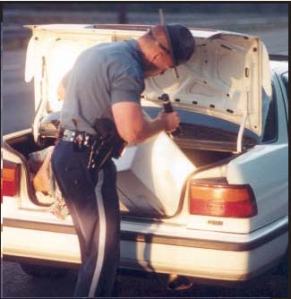Vehicle Searches Incident to Arrest
June 2, 2010
 When can police officers search a vehicle? When they are arresting the occupant of the vehicle. In 1981, the United States Supreme Court in the case of New York v. Belton, 453 U.S. 454, stated “when a policeman has made a lawful custodial arrest of the occupant of an automobile, he may as a contemporaneous incident of that arrest, search the passengers compartment of that automobile and any containers therein.” The court rendered this decision based upon a “generalization that articles inside the relatively narrow passenger compartment of an automobile are in fact generally within the area in to which an arrestee might reach in order to grab a weapon or evidentiary item.” Fran Simmel v. California 395 U.S. 763.
When can police officers search a vehicle? When they are arresting the occupant of the vehicle. In 1981, the United States Supreme Court in the case of New York v. Belton, 453 U.S. 454, stated “when a policeman has made a lawful custodial arrest of the occupant of an automobile, he may as a contemporaneous incident of that arrest, search the passengers compartment of that automobile and any containers therein.” The court rendered this decision based upon a “generalization that articles inside the relatively narrow passenger compartment of an automobile are in fact generally within the area in to which an arrestee might reach in order to grab a weapon or evidentiary item.” Fran Simmel v. California 395 U.S. 763.
In a decision of April 2009, the United States Supreme Court in the case of Arizona v. Grant narrowed the circumstances under which there can be a search incident to arrest. In the Grant decision the United States Supreme Court stated that police may now search a vehicle incident to the arrest of the occupant of the vehicle only if the person being arrested is “unsecured and within reaching distance of the passenger compartment at the time of the search” or “it is reasonable to believe the (the passenger compartment) contains evidence of the arrest.”
The court stated in this decision “when the justifications are absent, a search of the arrestee’s vehicle will be unreasonable unless police obtain a warrant or show that another exception to the warrant requirement applies.”
In the a situation where the police arrest an individual driving a vehicle, place him custody, in hand cuffs and remove him from the vehicle and place him in the squad car there would be no reason for the police to engage in a warrantless search of the occupants vehicle unless a crime was committed involving contraband or a gun and police were searching for the contraband or gun.
Unfortunately this decision has not filtered down to most police organizations. Police routinely search vehicles when they put an occupant under arrest without justification. The prosecutors then seek to use any evidence obtained from said searches in the prosecution of the driver or other occupant of the vehicle. Based on this new United States Supreme Court decision, motions can be made to preclude the entry into evidence of material obtained through improper searches. If you or a friend or family member have been arrested and a vehicle was improperly searched feel free to give our office a call at 1-800-344-6431 or email us.
Strip Searches: The Court Of Appeals Says No, No!
May 29, 2010
 Is it a common practice for police to use a search warrant to strip search every person in a location without a strong indication the place is “devoted” to criminal activity.
Is it a common practice for police to use a search warrant to strip search every person in a location without a strong indication the place is “devoted” to criminal activity.
Recently the New York State Court Of Appeals said that drugs found on one man in 2006 during a raid of an apartment in Syracuse can not be used as evidence. Robert Mothersel and six other individuals were stripped searched on this occasion.
The New State Court Of Appeals said broad-based search warrants are unconstitutional unless police surveillance shows every person at a particular location would have contraband or criminal evidence on them. In the case involving Robert Mothersel, the court found the strip searches were inappropriate. Mr. Mothersel was stripped searched and a body cavity search was conducted. Drugs were found in his buttocks. At the time of the search Mr. Mothersel was not under arrest. The Court of Appeals found the drugs found in Mr. Mothersel’s buttocks were illegally obtained and could not be used against him in court.
A Syracuse detective involved in the case stated at a court hearing “in the execution of hundreds of all-person-present warrants, the people were routinely stripped searched and required to facilitate the examination of their anal and genital cavities.”
Judge Libbman, writing for the New York Court Of Appeals, described circumstances wherin such broad-based strip search warrants would be approved.
He stated “we think it is clear that surveillance of a location may yield a factual basis to infer with the requisite force that the place is devoted to an ongoing illicit purpose, such as the manufacturing or marketing of narcotics, . . . and that all those present at the time of the contemplated search will probably in possession of contraband or other specified evidence of illegality.”
Strip searches, and especially body cavity searches, can amount to the deprivation of the most basic rights of privacy a United States citizen should expect. We hope you never experience this humiliating situation. If you or a family member were improperly subject to an outrageous violation of your right to privacy feel free to call us at 1-800-344-6431 or contact us by email. We will protect your rights.
DNA: A Case Solving Tool Or Brave New World
May 19, 2010
 There are presently more than a dozen pieces of legislation pending in the New York State Legislature to expand the use of DNA material. Recently a DNA data bank was utilized by Westchester County legal authorities to match the DNA of Francisco Acevedo for the murders of three woman in Yonkers from 2009.
There are presently more than a dozen pieces of legislation pending in the New York State Legislature to expand the use of DNA material. Recently a DNA data bank was utilized by Westchester County legal authorities to match the DNA of Francisco Acevedo for the murders of three woman in Yonkers from 2009.
Francisco Acevedo was arrested while driving intoxicated on January 26, 2009 in Brentwood Long Island. As part of that arrest Mr. Acevedo’s DNA was taken from him last year while he was serving a prison sentence in upstate New York. This was a result of multiple felonies convictions for driving while intoxicated convictions.
His DNA was compared to a data bank maintained by the State of New York which was established in 2004. The data bank linked him to three murder victims. Mr. Acevedo now faces multiple charges of first and second degree murder. Presently state law requires DNA to be collected from individuals convicted of felonies and a variety misdemeanors. The state of New York currently obtains DNA material from approximately 46% of all individuals convicted of crimes.
State Senator Dean Skelos, from Rockville Centre New York , wants the law modified so that DNA samples are taken from every single person arrested or under suspicion for committing a felony or misdemeanor.
State Senator Skelos claims that the Acevedo case is a good example of the types of crimes that would be solved if the states DNA data bases were expanded. Senator Skelos further stated that the expanded data base could solve crimes going back as long as 30 years. Senator Skelos was asked if he had privacy concerns regarding the expanding of the data base. His response was his job was to protect the public.
Expanding DNA data bases may be helpful in solving some crime however the over expansion of DNA collection makes me think of Aidous Hudley’s book “A Brave New World”. Americans are entitled to rights of privacy. A reasonable accommodation should be made for DNA collection but not at the expense of basic rights for American citizens.
If you are under suspicion or charged with a crime, contact the law office of Elliot S. Schlissel. We have been helping our clients with criminal matters for more than 30 years. Contact us at 1-800-344-6431 or by e-mail.
Picture courtesy of criminals.com.
Can the Police Search Your Cell Phone Without a Warrant?
February 18, 2010
 In Ohio, cell phones protected by the 4th amendment’s prohibition against unreasonable search and seizure by the government.
In Ohio, cell phones protected by the 4th amendment’s prohibition against unreasonable search and seizure by the government.
In a recent decision, the Ohio Supreme Court has ruled that police officers need to obtain a warrant in order to search a cell phone. This decision by the Ohio Supreme Court takes into consideration the fact that cell phones today go far beyond the means of basic communication. They are mini computers that store large amounts of personal information. From this point forward, the personal information becomes a protected privacy right, at least in the State of Ohio.
Although most searches require warrants, police officers are allowed to search their immediate surroundings when dealing with potential arrests for their own self protection. The Ohio case involves a man named Antwaun Smith. He was arrested on drug charges. At the time of his arrest his cell phone was ceased and later it was searched. The police found information important to their investigation on his cell phone calling records.
The recent ruling of the Ohio State Supreme Court was a divided 4/3 vote. The decision indicated that Mr. Smith’s protection against unreasonable search and seizures under the 4th Amendment to the US Constitution were violated. The court, in its decision stated that cell phones are “capable of storing a wealth of digitized information”. The court’s decision indicated that individuals using cell phones have an expectation of privacy which is protected by the 4th Amendment to the US Constitution.
The Ohio court’s ruling creates a new type of privacy. As hand-held devices become more and more sophisticated, they will contain more and more personal information. Individuals rights of privacy in devices that are basically hand-held mini computers should be protected by the 4th Amendment to the US Constitution. I have every hope that when a case presents itself, the NY Court of Appeals will make a similar ruling that respects individuals rights of privacy against unreasonable searches and seizures of all types of hand-held telephones and computer devices.
Should you, a friend or a loved one be subject to what amounts to be an unreasonable search, the criminal defense attorneys at the Law Office of Elliot S. Schlissel can use their expertise and diligence to protect your rights and the rights of a friend or a loved one. E-mail or call us at 1-800-344-6431.
Picture courtesy of the Daily Iowan.
 Established in 1978,
Established in 1978, 